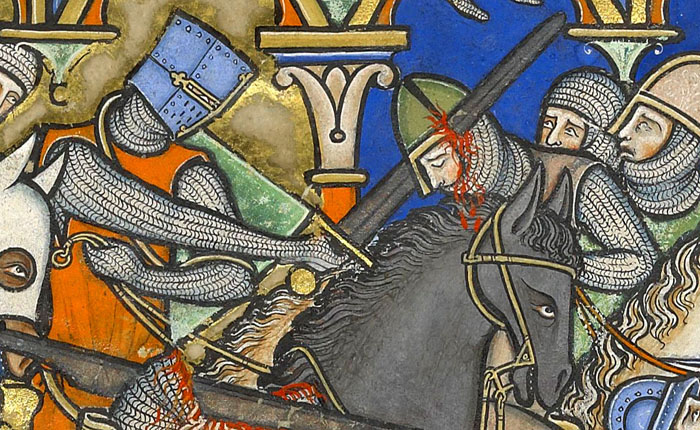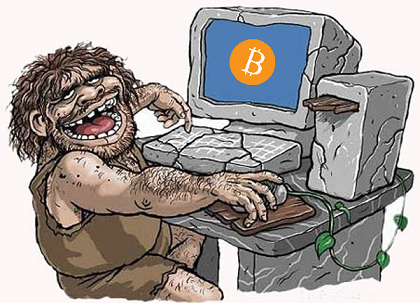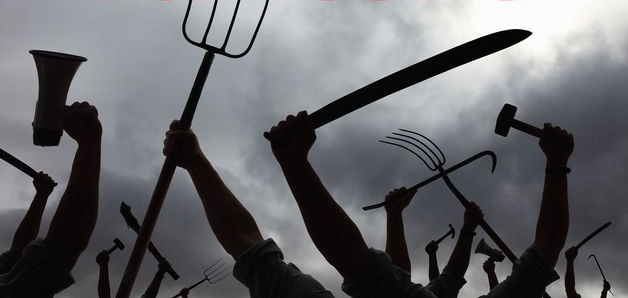Dark Ages 2.0

The Dark Ages are a somewhat bleak period of history spanning several hundreds of years after the fall of the Roman Empire. When people think of the Dark Ages we often talk about the Crusades, kings & queens, feudalism, and the general decline of the economy, intellect, and culture.
After doing a little bit of research on the topic, it becomes clear that those who lived and died during this time didn't really think of it as the Dark Ages. But I suppose that's how history works, eh? Just like Plato's allegory of the cave, we do not realize that we live in darkness until we actually step into the blinding light. These things tend to be defined in retrospect rather than in the moment.

Cyclical nature of history
History doesn't repeat, but it often rhymes. Are we headed into a new dark age with the decline of the American Empire? There's certainly a good argument to be made that humanity is hurtling toward a cliffside; stepping on the gas rather than applying the breaks.
Or perhaps we are living within a time period that will be referred to the Dark Ages after the fact. That's also a distinct possibility. We could have lived our entire lives within the Dark Ages and not even have realized it, just as those who lived through the first one. The blinding light has yet to illuminate itself.

Certainly that would be the preferred option.
Nobody wants all of society to collapse while having to start over from square one. Which of course assumes that we survived the collapse, which seems... unlikely to say the least. 8 billion people is a lot of mouths to feed in the event of the systemic failure of factory farming along with all our other infrastructure (water, power, etc).
If crypto can actually do the thing that it claims it can do, perhaps we can keep this broken system propped up just long enough to make the difficult transition from where we are now to where we need to be. The days of people being in charge seem to be coming to an end. People are fallible, and power corrupts. The goal is to eventually put our ideals and rules in charge of themselves. We have the technology to do it, but the infrastructure is still severely lacking. Nobody said automating an idea would be easy, but that does appear to be the end-game, nonetheless.

Year of our Lord, 2022
The way in which time is measured, is odd to say the least. I have made the claim that if blockchain actually does the thing it was designed to do, we will have to rewrite the history books themselves. It will no longer be the year 2022, but rather year 13, with Year Zero being assigned to 2009, the year Bitcoin was born. That is the level of importance that this technology signifies.
Everything before the creation of Bitcoin would likely be referred to as the second Dark Age. It is not so much that life during the Dark Ages was so terrible, but rather that what came next was so radically different than before that the past became retroactively barbaric in nature when looked at through the lens of the present.
What would it take to get there from here?
It's quite simply a matter of power. Imagine a world were crypto communities rise up and have more power than any country in the world. What does it look like when people can choose their own governance models? What does it look like when intellectual property does not exist and all data becomes open source? What happens when every little dirty secret that every government/corporation/bank has perpetrated comes into the limelight for everyone to see?

And I'm not even implying that 'evil' people need to be punished for what they've done. I'm only interested in making society a better place. If that means wiping the slate clean and starting over, so be it. We have thousands of years of evidence to suggest that making examples of people who get caught is not a very good deterrent overall.
Negative reinforcement has massive diminishing returns. In most cases it appears as though our treatment of criminals actually makes the problem worse, not better. Of course they'll always be sure to parade the one guy who turned his life around and became a millionaire or whatever to make us believe that everything is working as intended. Good stuff, but the statistics tell a completely different story.
Conclusion
So what do you think? Do you think we are living in the Dark Ages right now, or will it occur after the collapse of the American Empire? Perhaps such a thing isn't even possible in this modern age. After all even if our economic systems collapse and the grid goes offline for a bit, much of the data we need to reboot society will be right there waiting for us.
Time is speeding up. The last Dark Age lasted hundreds of years, but is it reasonable to assume that could ever happen again given such insane advances in technology? When the Roman Empire fell, what was lost? How is that time incomparable to modern day? Has crypto already presented us a solution in the face of this overwhelming problem? I guess we'll see how it plays out.
It's easy to see the vulnerabilities within society and see crypto as a solution to many of these problems. It's also easy to see many vulnerabilities in crypto. How could Bitcoin possibly take over if a huge chunk of the infrastructure it relies on (internet, exchanges, banks, computers/phones) are all controlled in a centralized manner? I think what many fail to realize is that these networks tend to defend themselves by any and all means necessary. Such are the tenants of decentralization. The convenient (centralized) solution is employed until it becomes invalidated by a changing environment. This is the entire reason why crypto even exists in the first place.
At the crux of it all is money and the value it represents. Whoever is building the most value inevitably is going to win out during a battle of attrition. Either crypto is a scam and it's all going to zero, or it will gain enough adoption to flip the entire economy on its ear. If politicians can be bought to fight against Bitcoin, we see they can also be 'hired' to do the exact opposite. Ah well now I'm rambling I guess I'll just kill it.
Posted Using LeoFinance Beta
Before 2010-2020ish I definitely thought we were much more evolved (technologically, culture, society..) than the dark ages in medieval times. But now I see how wrong I was. I mean sure, technologically we have come a long way. But in society/culture there are still the same pitfalls we fall into (cancel culture, mass formation psychosis etc.)
So yes I think we are still living in the dark ages
Why do you think the American Empire is collapsing? I don't think internal strife is relevant for its international position. There were violent race riots at the height of its power. The Eastern Roman Empire lasted a thousand years after the fall of Rome while it was divided by power struggles and bitter conflicts about details of theology.
Now, the US is energy-independent, and has more population growth than Europe, Japan or China, while the dollar is strong compared to other fiat money, and the 'second army in the world' is being destroyed by not even the most powerful American weaponry.
It's hard to even pick a starting point.
Basically every thing we do is unsustainable.
The entire system is propped up on fractionalized debt.
There are diminishing returns around every corner.
Just noticed that you're not even asking me... lol.
🤓
From looking at history and geology we can ascertain cycles. However we can also see clinal boundaries, and that's where I think we are right now. An example would be the Cambrian, when the diversity of life exploded exponentially, and this was not a cycle, but a biocline whereafter life has continually been far more diverse than it was prior.
We are poised to experience, or actually, are experiencing, such a clinal boundary technologically. As far as we can ascertain from publicly available information Stone Age technology persisted for eons, literally hundreds of thousands of years without significant advance, despite H. sapiens being essentially identical to our present physiological, mental, and discernible form. Skeletons of H. sapiens as old as 400kya are indiscernibly different from modern skeletons.
Between ~40kya and ~10kya agriculture suddenly erupted and spread across the world. It's really impossible to say when it began because of the more than 100m rise in sea level that yet conceals the vast majority of archeological evidence of human occupation, since ~90% of people live within 10m of sea level, and always have. Given that fact, I find the claims of archeologists that such evidence as remains available to them above the waves is authoritative ludicrous. Gobekli Tepe dramatically questions the entire narrative regarding when societies became capable of massive institutional control and development, since that megalithic construction was undertaken immediately following the vast majority of rise in sea level following the end of the Younger Dryas, built at elevation, and immediately buried by the builders, which strongly suggests it wasn't built for any purpose but to secure the megaliths from potential erosion for as long as possible.
For us.
Anywho, the advent of collective industrial development enabled centralization, and technology began an advance that has gradually increased the speed of advance such that it is apparent that the more advanced technology is, the faster technology advances. Today, as I continually point out, in every field of industry technology is advancing decentralization, and increased productivity isn't created through economies of scale, but bespoke local production. An essential means of increasing productivity is eliminating parasitic losses. An essential feature of centralization is overlords. Overlords are the parasitic losses. Decentralization eliminates overlords.
Centralization is incapable of competing with decentralization because eliminating parasitic losses and distributing production massively increases efficiency and the wealth potential to producers, which is the primary reason producers produce. What we can see of the present technological capability suggests that production of all necessities, from food and power, to housing and security, are well provided by decentralized means of production, and further that novel abilities, such as cryptocurrency, global communications, and space travel, also are becoming possible.
It is not hard to see this as a clinal boundary, particularly regarding technologies like 3D printing and CRISPR that enable individual households to make their own spaceships and innovate their DNA without some kind of centralized control. While how exactly future development and technological advance will progress is unpredictable, it is predictable that greater prosperity, liberty, and felicity will result, because those are reasons people act.
I see that overlords resist the loss of their flow of parasitized wealth and power, and implement such means of preventing society from effecting that paradigm shift to decentralization, for obvious reasons. I also note that due to the nature of centralization, overlords are incapable of competing with decentralization and playing whack a mole with the entire population of the planet is far beyond their conception. As development of decentralized means of production continue to advance and disperse across the population, the overlords increasingly cannot cope with the diversity and prosperity those they seek to parasitize gain. They are outnumbered at least a million to one, and can't think of the ways people think of to free and enrich themselves a million times faster and better. They're just people. Broken psychopaths, to boot.
Because of these things I expect our posterity to succeed at decentralizing society and restoring the egalitarian society humanity evolved in when every household had to make what they needed themselves with Stone Age technology, but also creating the blessings of civilization that are prosperity. I see that centralization is a temporary phase humanity has endured while technology advanced to this clinal boundary, from the Stone Age to the Space Age.
Using aquaponics the environmental damage and oppression industrial agriculture effects are eliminated, and once aquaponics is mature that technology can be exported to literally everywhere. It's not limited to Earth. Once 3D printing is mature, individual households and small communities will be able to build spaceships themselves. Relativity Space is already 3D printing spaceships today, and it's easy to predict that technological ability will continue to develop and disperse, as technology always does.
The sky is literally not the limit anymore, and that well illustrates that decentralization is a clinal boundary, and not simply a cyclical repetition. Once humanity has left Earth and can maintain it's needs and progress, there's simply no possibility of imposing any kind of centralized authority. Unless we go extinct (in which case nothing matters, at all), we will be free. It's just a matter of time and engineering.
From that perspective, everything that has gone before is prehistory.
Crypto is but one aspect of decentralization, and once decentralized means of production are mature and ubiquitous, will have little utility IMHO. Who will need money when they can just make everything they need? It is, however, a necessary transitional mechanism to wrest control of wealth from overlords and prevent parasitization as we transition from centralized parasitizable production to decentralized parasite proof production.
That's why it is at the forefront of development today.
Thanks!
Comment is longer than the OP.
Did I just get ratioed?
It's not. You've wrought a full 155 more words in the OP than I did in response. It's an issue I focus on because I find it of great import in every way imaginable, and particularly from an investment standpoint, so tend to exposition as I am inspired. Your OP was inspirational.
Tearing down arbitrarily is not the answer either. That's just post-modernism.
Tear down what is evil, I can get behind that. And I get what you're saying about not merely punishing the bad actors and moving on. That's not productive either, if we also keep what the bad actors built.
Well, it’s not as if it’s been all sunshine and happiness, even at the peak of the American Empire. And our relative decline is tempered somewhat by China’s wretched demographic profile. Hell, over the next few decades, India could emerge as a more effective Asian power than China.
My gut feeling is that IF we can avoid a thermonuclear exchange, we’ll muddle through and avoid a Dark Age.
Check out the new show on Amazon called “peripheral” quantum data tunnels, used to time transfer from a VR headset.
Interesting that year 2009 was also very important for me personally. I will never forget that year.
That would be close to paradise. A dream come true!I want to taste living in such a world.
Posted Using LeoFinance Beta
https://twitter.com/1415155663131402240/status/1584354997617446912
https://twitter.com/494429019/status/1584486195295571969
The rewards earned on this comment will go directly to the people( @rzc24-nftbbg, @successforall ) sharing the post on Twitter as long as they are registered with @poshtoken. Sign up at https://hiveposh.com.
Congratulations @edicted! You have completed the following achievement on the Hive blockchain and have been rewarded with new badge(s):
You can view your badges on your board and compare yourself to others in the Ranking
If you no longer want to receive notifications, reply to this comment with the word
STOPIt's clear that the government isn't pleased with crypto currencies because people are daily loosing trust in the banks and government is by extension loosing 13 years in the line since the birth of Bitcoin with daily expansion of the idea of crypto currency tagging the years and the economy logic of the world before 2009 and now as dark age isn't that poor personally when I heard about BTC I had enough money to buy even 100 but I didn't buy even one because I was still in the dark as at the time because it was very cheap but with people's eye been enlightened, I can't afford 0.2 btc with what I could use to acquire maybe 100 BTC now. which other time is darker age than when then . I have seen the light and the money in the bank has little or no way to compare the progress crypto currencies makes and is making.
I just imagine how it would be like when the whole country have their own governance over the money they have and without anyone giving the restrictions on what to do with it.
There is some interesting reading that suggest the Dark Ages was a misnomer.
Also, this.
Posted Using LeoFinance Beta
I did see that during my Google travels.
Somewhat addressed in the OP by themes of perspective and defining history after the fact.
Interesting nonetheless.
I've often thought that the Evangelical church is entering into a Dark Ages of its own, but reading these articles on the Dark Ages being a misnomer made me re-think my idea of what it means to be a dark age. If there is a Dark Ages 2.0, I'd say we are at the very beginning of it, not near the end.
It really depends on if crypto can empower communities to the point where citizens no longer require the state. Blockchain can fund research in a way that capitalism can't. It can monetize hundreds of paths that where previously closed to us.
That is true, but the so-called Dark Ages had more to do with literacy and culture. I certainly think crypto can lead people to engage more through the free exercise of their monetization rights, but the internet was supposed to do the same thing. Now look at it. A benefit is only a benefit if people recognize it as a benefit and exercise that benefit for their advantage. If they choose not to do that, then they are essentially blindfolding themselves and walking around in the dark.
Dear @edicted,
Your support for the current Hive Authentication Services proposal (#194) is much appreciated but it will expire in a few days!
May I ask you to review and support the new proposal (https://peakd.com/me/proposals/240) so I can continue to improve and maintain this service?
You can support the new proposal (#240) on Peakd, Ecency, Hive.blog or using HiveSigner.
Thank you!
No collapse sir... This thing is indesctructible.
too big to fail BB!